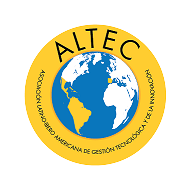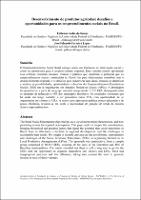| dc.contributor.author | Godói-de-Sousa, Edileusa | |
| dc.contributor.author | Ferreira Lopes, José Eduardo | |
| dc.date.accessioned | 2021-05-27T15:55:55Z | |
| dc.date.available | 2021-05-27T15:55:55Z | |
| dc.date.issued | 2013 | |
| dc.identifier.uri | https://hdl.handle.net/20.500.13048/852 | |
| dc.description.abstract | O Empreendedorismo Social Rural emerge como um fenômeno de intervenção social, e como via promissora para o desenvolvimento regional. Esse trabalho propôs aprofundar essa reflexão, trazendo insumos teóricos e práticos que sinalizem o potencial que os empreendimentos sociais constituídos no Brasil têm para efetivamente contribuir com o desenvolvimento regional, e os desafios para concretizar seus ideais. Buscou-se identificar e analisar as possibilidades, oportunidades e desafios dos Empreendimentos Econômicos Sociais (EES) em se organizarem em Arranjos Produtivos Locais (APLs). A abordagem foi quantitativa, a partir de um grupo amostral composto de 10.513 EES, abrangendo todas as unidades da federação e 48% dos municípios brasileiros. Os resultados revelaram que há ainda um longo caminho a ser percorrido pelos EES, com oportunidade de se organizarem em clusters e APLs. A maior parte apresentou práticas pouco adequadas e de pouca eficiência, levando-se em conta a necessidade de geração de renda da maioria desses empreendimentos. | |
| dc.description.abstract | The Rural Social Entrepreneurship emerges as a social intervention phenomenon, and how
promising avenue for regional development. This paper seeks to deepen this consideration,
bringing theoretical and practical inputs that signal the potential that social enterprises in
Brazil have to effectively contribute to regional development, and the challenges to
accomplish their ideals. We sought to identify and analyze the possibilities, opportunities
and challenges of the Social Economic Enterprises (SEEs) in organizing themselves in
Local Productive Arrangements (LPAs). The approach was quantitative, from a sample
group comprised of 10,513 SEEs, covering all the units of the federation and 48% of
Brazilian municipalities. The results revealed that there is still a long way to go for the
SEEs with the opportunity to organize themselves into clusters and LPAs. Most had
inappropriate practices and low efficiency, taking into account the need to generate
income in most of these ventures. | |
| dc.language.iso | spa | |
| dc.rights | info:eu-repo/semantics/openAccess | |
| dc.rights | Atribución-NoComercial-SinDerivadas 2.5 Perú | |
| dc.rights.uri | http://creativecommons.org/licenses/by-nc-nd/2.5/pe/ | |
| dc.subject | Productos agrícolas | |
| dc.subject | Desafíos | |
| dc.subject | Oportunidades | |
| dc.subject | Empresas sociales | |
| dc.title | Desenvolvimento de produtos agrícolas: desafios e oportunidades para os empreendimentos sociais no Brasil | |
| dc.type | info:eu-repo/semantics/conferenceObject | |
| dc.relation.conferencedate | 27-31 de octubre, 2013 | |
| dc.relation.conferencename | XV Congreso Latino-Iberoamericano de Gestión Tecnológica | |
| dc.relation.conferenceplace | Porto, Portugal | |
| dc.contributor.corporatename | Universidade Federal de Uberlândia | |


